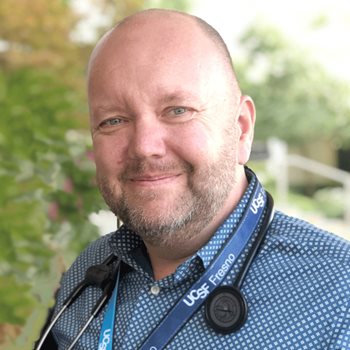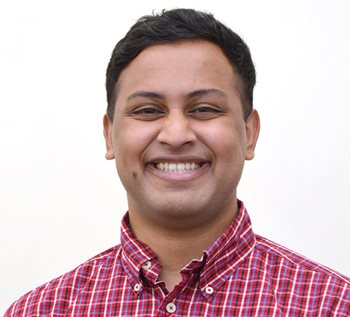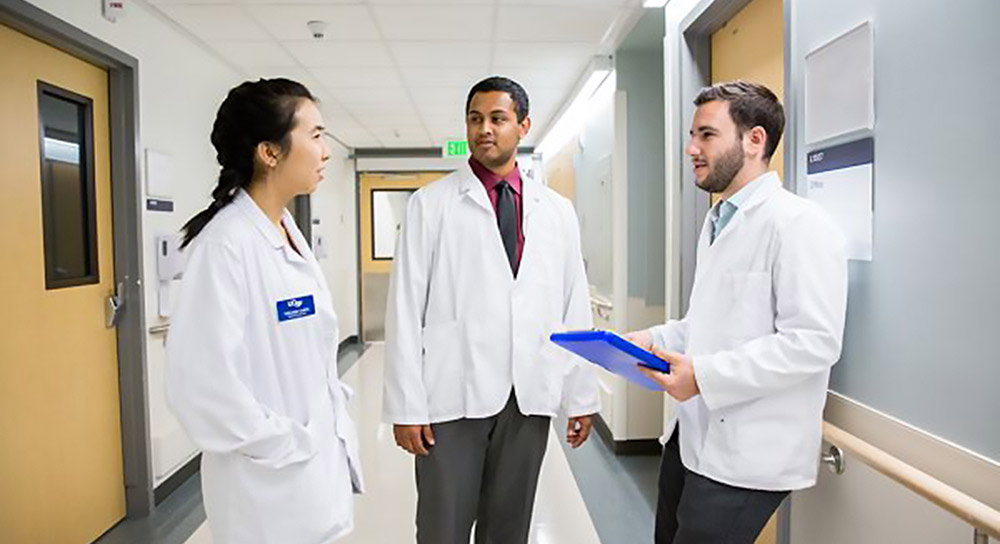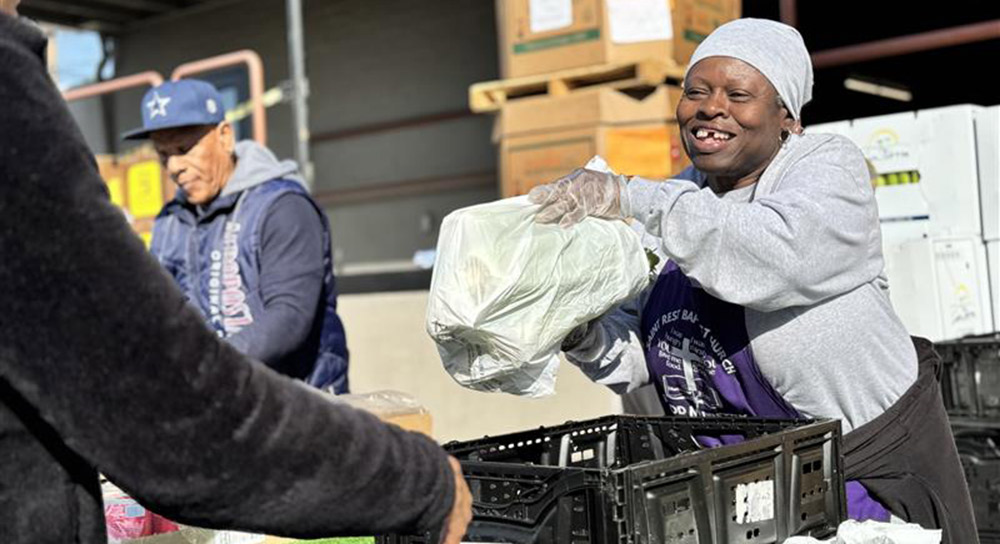Dr. Richard Kiel always knew if he became a heart specialist, he’d want to come back to train and serve patients in the Valley where he was raised. “But I wasn’t even considering training here because of the lack of fellowship training opportunities,” he said.
 That all changed in 2007 when UCSF Fresno became one of two programs nationwide to receive accreditation to start a cardiovascular fellowship.
That all changed in 2007 when UCSF Fresno became one of two programs nationwide to receive accreditation to start a cardiovascular fellowship.
Dr. Kiel was in medical school in Philadelphia when he saw a press release from Community Regional Medical Center and UCSF Fresno announcing three new fellowships, including the one he hoped for.
“It was just like a light switch flipped,” he described his delight in learning that Fresno had been able to recruit Dr. John Ambrose, a pioneer in heart attack and heart pain symptoms and treatments, to help head the training. “Not only could I come back to Fresno and train here, but the stars aligned with what I really wanted to learn. It became my number one choice.”
Since then, Dr. Kiel has become an assistant clinical professor in cardiovascular disease with the UCSF Fresno program where he trained. “When I came back to join this program, I wanted to make sure we were able to offer these resources to every patient so it was fair or equitable,” he said. “The hospital has been really responsive to the community and the needs of the community in being able to offer this.”
Creating more access to heart specialists
Dr. Kiel oversees nine fellows in the three-year training program plus an interventional cardiology fellow doing an additional year of training on things like putting in heart stents and replacing aortic valves via catheter.
Additionally, the program includes an advanced imaging fellow training on cardiac CT scans and cardiac MRIs. That’s 11 additional heart specialists who are treating patients at Community Regional, Fresno VA Medical Center, the Family Healthcare Network clinic on the Community Regional campus, and most recently at Clovis Community Medical Center as part of the Heart & Lung Institute – Community Health System’s system-wide approach to cardiac care.
“Our ultimate goal is to get them to stay locally,” said Dr. Kiel. The Central San Joaquin Valley continues to have one of the lowest doctor-to-patient ratios in the state. Access to care has been identified as among the top healthcare challenges in the region, according to the most recent Community Health Needs Assessment, with residents citing long wait times for appointments, not enough doctors and lack of insurance as top barriers to care.
Since the cardiovascular fellowship started in 2009, 55% of graduates have decided to stay and practice in the San Joaquin Valley and 80% are continuing to practice in health provider shortage areas where doctor-to-patient ratios are very low.
Community has a 48-year partnership with UCSF School of Medicine to train about 300 residents and fellows annually at Community’s hospitals and clinics. During the past 10 years, Community has invested nearly $540 million to fund the operating expenses of UCSF Fresno as part of its community benefit investments. Community’s $46 million in annual support for the residency program includes the cost of faculty, residents’ and fellows’ salaries and associated overhead.
The UCSF Fresno cardiovascular fellowship has also become a prestigious destination for physicians finishing their initial residency program. Last year, 680 applied for the three open positions. “We’re looking for the most qualified, but if someone has a Valley background or history, they have higher priority on our list since they’re much more likely to stay here,” Dr. Kiel said.
Valley native hopes to be hometown’s next cardiologist
 Dr. Philip Kingsford, a Visalia native and first-year cardiovascular fellow, hopes to do exactly that. “This program was at the top of my list. To come back home and be able to take care of the population here … I’m hoping to stay in the area, either to practice here or maybe back home in Visalia, and help offset the disparities that unfortunately the folks here in the Valley face.”
Dr. Philip Kingsford, a Visalia native and first-year cardiovascular fellow, hopes to do exactly that. “This program was at the top of my list. To come back home and be able to take care of the population here … I’m hoping to stay in the area, either to practice here or maybe back home in Visalia, and help offset the disparities that unfortunately the folks here in the Valley face.”
He’s well acquainted with disparities in healthcare. “My dad’s a pediatrician so there was always a focus on giving back to the community while growing up,” explained Dr. Kingsford. As a President’s Scholar in the Smittcamp Family Honors College at Fresno State, the focus again was on community service. While volunteering at Valley Children’s Hospital as an undergraduate, he cemented his love for medicine and for service to those most in need.
Dr. Kingsford did his medical residency at Los Angeles County-USC program and could’ve stayed for his advanced fellowship training, but was drawn back home. He’s found the same big-city medicine practiced at Community Regional, but sees an even bigger need for specialists here since there are fewer hospital choices.
“I think Community is doing a great job of trying to take care of this community and we could always use more physicians down here to try to help offset these disparities folks face," he said.
Fellowship training helps address healthcare inequalities
When Dr. Kiel did his advanced heart failure and heart transplant fellowship training in San Francisco at UCSF, more than 25% of his patients were from the Fresno area. “And this was a very select group who could afford to drive up once a week and stay overnight for testing and who had insurance,” he observed. At that time, before the cardiovascular fellowship was established here, many more patients who needed advanced heart care couldn’t afford it or make the long drive to the Bay Area.
Growing up in Oakhurst, Dr. Kiel also watched his father drive three to four hours for medical treatments in the Bay Area and Los Angeles. The medical specialists and technology he needed weren’t available locally. That struggle, he said, “sparked an interest in me to even think about medicine and how it would be nice if there was a specialist in Oakhurst.”
In medical school, Dr. Kiel began to look closely at disparities in healthcare: “California is the most populous state in the nation and the most prosperous state in the nation up until this year, but also it is horribly underserved not only in terms of primary care but in terms of sub-specialty care as well. Outside these pockets of the Bay Area and west LA, people in the rest of California have half the access to primary care and sub-specialty care as they do in the larger cities … There is so much Medi-Cal and government-funded insurance here that it really creates barriers to care.”
Those barriers include specialists who limit the number of Medi-Cal patients they see, often creating long waits to get an appointment. Patients’ healthcare suffers, said Dr. Kiel.
“For me, to see the role of the fellowship program here was really about making things more equal. The idea behind the fellowship and the whole UCSF Fresno program is to bring providers to the Valley and help Valley people become providers, but also to bring in new techniques, new resources, new treatments,” Dr. Kiel asserted.
Patients benefit with access to more advanced heart procedures
Patients benefit not only from increased access to doctors but also in shorter wait times and having more advanced options for heart care with the fellowship. It expands access to treatments like:
LVAD (left-ventricular assist device) for those waiting for a heart transplant
TAVR (trans-catheter aortic valve replacement) a minimally invasive way to replace a diseased heart valve that helps avoid open-heart surgery
MitraClip procedures to fix the mitral heart valve using a small implanted clip inserted with a catheter
CardioMEMS to insert a heart monitoring device to help doctors remotely track patients with advanced heart failure and get them to the hospital faster when there’s an issue
Fellows also are doing research looking at exotic diseases such as “stiff heart syndrome,” and how to better monitor pregnant women with heart disease to make sure their deliveries are as safe as possible. They’re also starting new research to look at higher incidence in the local Hmong population of thoracic aortic aneurysms, or dangerous bulging of arteries near the heart.
“These are just some of the resources that people would have to drive out of town for if they were even able to drive out of town,” Dr. Kiel observed.
“To have this fellowship is just an incredible, incredible blessing for patients,” he added. “I feel very lucky to be part of this program and very grateful.”





